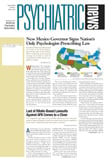While the National Institutes of Health is having difficulty quantifying U.S. taxpayers’ return on their investment in research (
see story at left), the drug industry is heralding recent successes in its quest to “bring newer and better medicines to patients.” Among 32 new treatments approved by the Food and Drug Administration (FDA) in 2001 were one for schizophrenia and one for Alzheimer’s disease.
The Pharmaceutical Research and Manufacturers of America (PhRMA), the industry’s largest trade group and primary lobbying organization, said last month that those 32 new treatments—22 medications, two vaccines, and eight “biologics”—are the result of a decade-long record investment by pharmaceutical companies in research and development.
In 2001 the industry spent an estimated $30.3 billion in drug development, a 16.6 percent increase over research and development expenditures during 2000.
Included in the FDA’s 2001 approvals were Pfizer’s new antipsychotic, ziprasidone HCl (Geodon), and Janssen Pharmaceutica’s new treatment for mild-to-moderate Alzheimer’s disease, galantamine hydrobromide (Reminyl).
Among the 20 other medications approved during the year were five for heart disease, five for infectious diseases, three for cancer, two each for arthritis, glaucoma, and migraine headaches, and one for HIV/AIDS. Two new vaccines were also approved.
In addition, eight biologically engineered treatments were approved for anemia, leukemia, rheumatoid arthritis, prevention or treatment of hepatitis A, B, and/or C, and sepsis.
The Tufts University Center for the Study of Drug Development estimates that the 32 new products will be used to treat diseases that lead to an estimated $250 billion in annual costs for health care, disability, lost productivity, and mortality.
Development of the new treatments was not only expensive, it also was time consuming. According to estimates by Tufts, each of the 32 new medications represents an average development cost of $802 million, a 250 percent increase over average development costs 10 years ago.
On average, according to the Tufts data, development took 10 to 15 years. The 22 medications and two vaccines approved last year spent an average of 16.4 months under review by the FDA. The eight biologics took slightly longer to win government approval, 19.6 months.
Interestingly, Pfizer’s ziprasidone took the longest—46.7 months—due to significant concerns over its adverse-event profile (Psychiatric News, March 2, 2001), while the approval of galantamine went through in a very average 17 months. ▪
